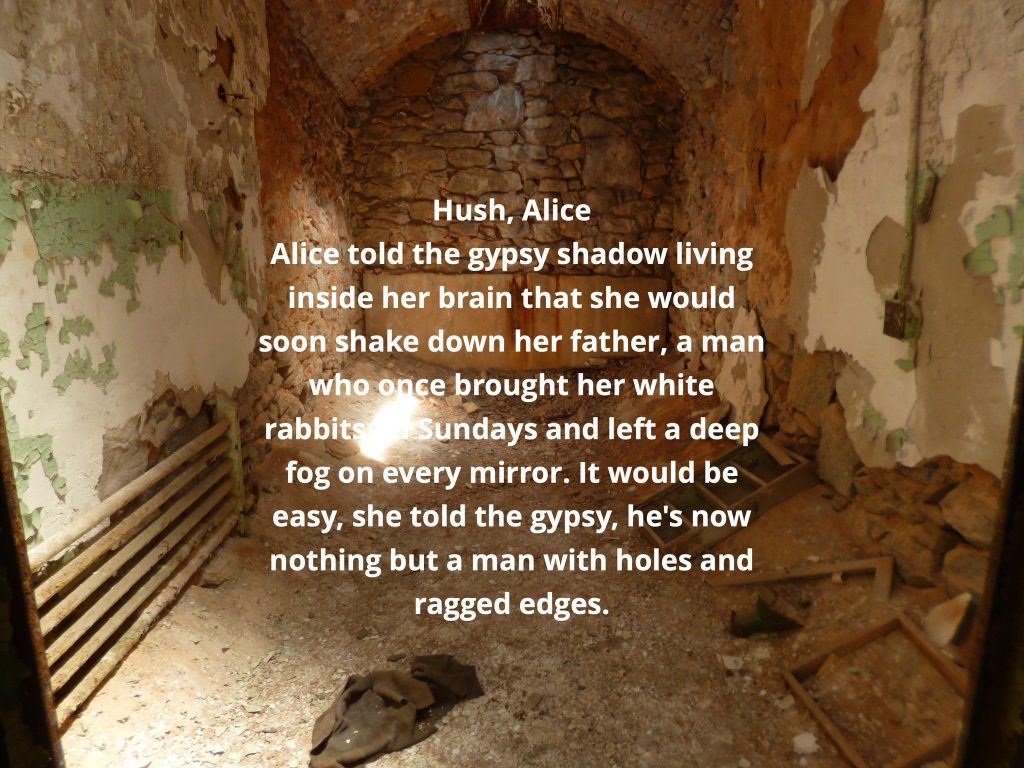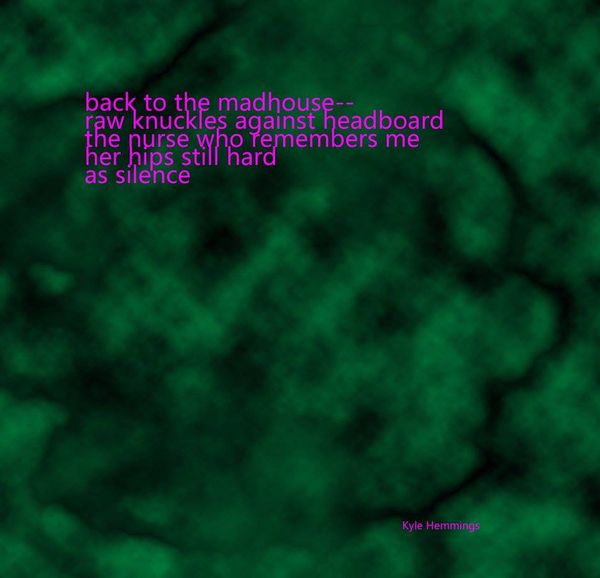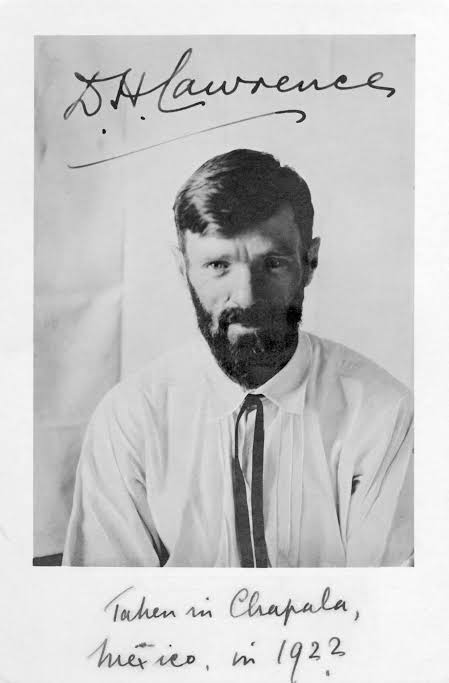




Rooms
Room A: The room where you watched the sun set with a dyslexic boy you named Squirrle
Room B: The room where your rejected lover tapped a Morse code against his shaved head
Room C: The room where your father-on-parole hid his little tin men under your bed. At night, they marched and drummed and sang German beer songs until you cried Uncle
Room D: The room where Penny dropped her glass eye and you could never hold her in the same way
Room E: When you’re 3 sizes too big for everything and can’t stretch backwards or sideways, you’ll reconstruct the room as floating space
Room F: Where you shared popcorn with a pickpocket who snuck rare coins into your dirty jeans
Room G: Where your brother returned home with his junkie love
Room H: The visiting nun who forgot to close the door to your room and left you to melt
Room I: When the room collapses from a fire, you are lighter than ash
Room J: The room where a boy named Jesus played banjo until your knees bled
Room K: The room where you gave birth to another room
That 70s Show
It was different then. We were as careless as near sighted thieves. We drank rock & rye until our hearts were too water-logged to beat an even rhythm. We dated people who didn’t believe our real names. We re-invented ourselves in the dark and couldn’t see what we made. We finally met again adrift in an empty ocean. “Are you floating alone?” an old friend asked me. “Yes,” I said, still am.” He smiled wistfully the way he once did.
All-Night Diner
Today’s special: Death at a discount
Choices: charcoal broiled, braised, fried with onions,
or just quick & dry.
served with truffles and parsley echoes.
Orange mushrooms too, if you prefer.
Family Guy
you took the rap
for your starry-eyed
father who never
learned how to swim
or how to collect
snowflakes in a
petri dish.
they hung you
from a cloud
A Ku for Emily
The warmth of your mouth
My words form couplets & thaw
Mars Brocke has been published in Otolith, Ink in Thirds, and elsewhere. He loves old garage bands of the 60s and still adores Iggy Pop. He also loves soft-serve ice cream.
Glass Doors
It isn’t difficult for me to imagine why it might
be that, outward action done for the night, Abby
would stand outside Mary’s glass-paneled,
completely curtained double doors, & listen to
us making love. All this time later, I see it as
a manifestation-in-action of The Lost Twins,
from Abby’s own vaunted masterpiece, rising
to the surface of Abby’s brain, & asserting their
presence. The male-leaning twin laughs at all
the pushing & grunting, the sleazy cheesiness
of what I have between my legs (she has one too),
as though I thought it made me big in the world
(it did not) to bang away at Mary as if the world
depended on it. The profound dumbness of sex
& sexual intercourse mixed with the pride of her
own phallic presence in the world, doing an even
more manly routine of being split, being two
people at once, and making both of them thrust
through the surface of human life, into art
taken from two places, willed into brilliant
singularity, in a way the grunting moron could
never understand. The male-leaning twin wins.
The real girl twin remains a coy maiden, building
up the guts to let herself into bed with me,
jealous of Mary’s easy submissiveness, as though
to the manner born, of letting the man be the man,
however dumb, & riding the waves towards twin
peaks, rather than Lost Twins, behind glass doors.
Adam Fieled is a writer based in Philadelphia. His books include Equations, Opera Bufa, and Apparition Poems. Manuscripts-in-progress include Something Solid, Letters to Dead Masters, and A Poet in Center City. A magna cum laude Penn grad, he edits P.F.S. Post.

Evaluate D.H. Lawrence’s Sons and Lovers as a case study of Freudian psychoanalytical genesis of the emotion of love.
A son loving his mother too dearly and in turn, the mother who lavished all her affection upon her son. Elusiveness and mystification of the psychic conflicts between mother, lovers, father and sons framework engenders the Freudian psychoanalysis and thus underscores the Oedipal and Electra complexes. Mr. Lawrence voices the struggle of the central protagonist Pual Morel to emancipate himself from maternal allegiance and thus transfer his affections to a fiancee who belongs to another human creed. Furthermore, mother and son are one and the husband is completely effaced and the father exists merely as a harlequin humbug.
Obsession with the possessive love between mother and son salvages the creaking domestic hearth’s explosive ambience from the parental violence and physical intimidation including banging fists, muffled voice, hurling of attics. Paul Morel’s tokens of love and appreciation such as the bouquet of flowers and extracurricular activities accomplished with accolades, medals and laurels become entirely dedicated to the heartfelt charismatic lady, Mrs. Gertrude Morel. This possessive obsession is explicated in the statements from the textual reference: “In the end she shared everything with him without know … She waited for his coming home in the evening, and then she unburdened herself of all she had pondered, or of all that had occurred to her during the day. He sat and listened with his earnestness. The shared lives.” Furthermore, this recreational exchanges and emotional correspondence provide salvation to Mrs. Morel’s macabre existence that compelled her life to a maniacal debacle, haunting the Derbyshire coal mining family.
Eventually with the demise of the patriarchal head of the family, Paul Morel’s dilettantism and hedonism frame the newly orphaned boy to earn a thirty and/or thirty-five shillings a week. With that petty finance Paul Morel intends to pursue a Bohemian lifestyle except purchasing a real estate shanty cottage in the neighbouring countryside and live there with his mother happily ever after. In this episode, Paul Morel develops a romantic affair for the neighbouring farming family maiden Mirriam Leiver, a loner, reticent, exalted and reserved girl. Herein, the intruder motherly figure creeps into the lives of these romancers to a hellish extent and that her intrusion, however, can be solely vindictive in case of apprenticing Paul Morel to surgical warehouse for the rapid surge in effeminization.
Nonetheless, Mrs. Gertrude Morel admonishes the camaraderie of vampirish girls such as Miriam Leiver emphasizing that, “She is one of those who will want to suck a man’s soul out till he has none of his own left.” This commentary satirizes the trenchant of a scathing wife to her husband. Relationship between the newly piquant romancers thus prove to be a futile endeavour if analogies to textual references are contextualized: “Oh, Lord let me not love Paul Morel. Keep me from loving him, if I ought not to love him” and “He was afraid of her. The fact that he might want her as a man wants a woman had in him been suppressed into a shame.” Tumultuous turmoil invades the relationship and thus virulent acrimony plagues their relationship through rhetorical estrangement and psychological alienation. Except the church gatherings harboured a sense of spiritual reconciliation by reuniting his two loves under the spell of the place of worship.
Even the maternal allegiance disintegrates to a dread and dreary affair as soon as gerontological diseases and William Morel’s death inflicted Mrs. Morel. Off late Paul Morel’s Lincoln Cathedral excursion proves to be a bizarro after witnessing Mrs. Morel to the emblematic manifestation in idolized version of an old sweetheart.
The amorous conquest progresses toward Clara Davies, distant relation of Miriam Leiver. She possesses sensual mysticism as revealed by the intimation of Paul in the statement that “She was to him extraordinarily provocative, because of the knowledge she seemed to possess and gathered fruit of experience. Afterall, Clara advises Paul that Miriam wanted sensual gratification instead of soul communion and fantasy imagination. In this way, she thus, boldly wields the shield of courage in the fantastical Paul Morel that he couldn’t have achieved out of his own accord. .
Morbid manifestations of the abnormal environment transforms the hero of the narrative fiction from a wreck and a ruin to a ruthless egotist and a vicious weakling in his dealings with the feminine characters. Even his masculinized maleness can be challengingly grisly by his dealing with his elderly mother whom he had stooped to get rid off. These human flaws are the result of the love instinct that gradually partakes with the sudden efflorescence and poetic charm booming from evolutionary stages of puberty. Freud explicates motherly love to be maidenly love that blooms during maternal caresses and intimate feelings of oneness, thus we feel a conscious passion for another individual of the opposite sex. Frank hostility and incessant jealously invoke the spirit of childhood and adolescence love fantasy and this testimony testified unbridled egoism. Paul Morel is tenaciously rooted in his maternal parent and doesn’t relinquish his hold upon her unless her elderly transition to old sweetheart.
Paul Morel’s dejection and desertion of love life is the result of the interweaving of immature phantasies of procreation with his former ideal adoration of his beloved mother Gertrue Morel. Furthermore Freudian psychoanalysis implies that male characters like Paul Morel chooses a girl who most resembles his mother and the heroine figures are likely to mate mostly with the man who reminds themselves of their fathers. Our fathers and mothers are ingrained imagoes in the veil of forgetfulness ever since childhood which we cannot obliterate.
Further Reading
Sons and Lovers: A Freudian Appreciation [1916], Alfred Booth Kuttner, Psychoanalytical Review, Vol. 3, No. 3, July 1916, pp. 295-317, D. H. Lawrence’s Sons and Lovers, A Casebook, Editorial of John Worrhen [Emeritus Professor of the University of Nottingham] and Andrew Harrison [a tutor in English Literature at the University of Warwick], Oxford University Press.
Let tie our broom sticks together and sweep the floor in our society.
A word of peace is like a kettle of water,
But we are now ruled by the kingdom of pieces.
Nowadays
Neighborhood is like enemies of yester age,
Where two neighbors live in the same compound but opponent heart.
The tree of hatred planted into our minds,
Who’s bear the fruit of conflict,
Growing stronger and bearing more fruits.
Hatred killing the foundation of good Morrow
Now today
Hatred is building the tower of conflict
Injecting odium Into the heart of today child.
Killing love in the mind of tomorrow men’s
Where indeed in yester age
A child spent a day in friend house
Where they Will play together
Eat lunch together
And even call the friend mother mummy
But in today years
We are lost in a black forest
Where our hatred have distract our children friendship
Always avoiding them from eating neighbors meals
Giving them toys to stop playing with the neighbors children
This are not the anthem of democracy we heard from larks during quadrennial replacement.
Half dead tree unlikely to bear fruit,
Watering with patience,
But refuse to change.
They are quadrennial replacement,
Yearning for the votes from our thumbs.
The trees are becoming enormous,
Like tree’s in the forest,
Standing with dry leaves.
They keep rejecting works
Becoming more baren than ever.
They grow to consume our toils,
But serving us nothing.
Moon(haiku)
Shining all the night,
In the gap between darkness,
That lighten the earth.
Market
A panel board,
That bridge different wires,
Red, black and yellow,
With different insulators
Wealth
Wishes that makes dream
Come true,
The pride of human
That defines existence.
Precious stone
Oh precious stone
Human are thirsty to have,
Hustle through curdles day and night.
Green fingers
The wealth of the nation
Waving at us
Agriculture growing
Crops mingling with us.
Stay in gist with them
From dawn to dusk.
Green fingers that wave at us
Like calabash on a river
Accompany us with air.
Green fingers
Our marketer
That we undergoes barta trade
Exchanging health and joy.
Argony(haiku)
Always Mood changer
That fills the heart with anger
Like a mourning one
I am in pain
Blood flow like stream
Embracing the soil
That reduce our fertile.
Bandit and Boko Haram
Acting of their choice
Insecurity embracing us
Victims have no fear for law again
Kill and earn
Murderer becoming occupation
Rule of law abandoned
People suffering from pieces
Peace have been buried cause by low security.
Nuraini Mohammad Usman is a passionate writer and student from Minna, Niger state with roots in Kano State. Inspired by his experience and culture, he crafts uplifting poems and stories that ignite positive change with a strong foundation from Better Treasure international school and Al-fawzul Azeem International School, Nuraini is currently honing his skills at Legend International School and Hilltop Creative Art foundation. He believes in the power of words to inspire and motivate others.
Nothing
I have never existed
Before
Being Here
I will never exist
Here again
After this
Everything else is just
Something that happens
In between nothing
When life takes an empty turn,
The performer collapses off the stage
The fire put on for the cremation burns down the script
The actor has nothing left to do in this drama
From all the glories of human pursuits,
Each of us can only take our portion of nothing
Gaurav Ojha
Kathmandu, Nepal
DECREATION
It is one moment past midnight
on the 8th day of morning.
Our Styx ferries become consumed
with the burning of bibles.
Seven heavens eighten themselves
and shrink and infinitize.
In this silent Babel
the sciencemagic we learned
while head over heels upside down
from hanged Marut and Harut
is finding and losing its feet.
Apocalypse collapses.
Ahuramazda unities
vanish darkness into bright.
Medusa’s pale horse Pegasus
comets Quetzalcoatl;
Fenris swallows the Eighth Archon
and then pukes and pukes him out.
The set sun eludes prediction.
No west exists to rise from.
CARNIVAL OF LOVE
The bearded lady
has two lovers,
the apeman and the geek.
Their sex is crazy,
peeling rubber
on high wires and the street.
When bearded lady
becomes mother
to a new circus freak,
the lucky baby
has two others
to help him feel unique.
FOWL WEATHER
Six ducks in a pond
swimming through a warm sweet spring rain–
pond is duck is air.
STILL STRANGERS:
EROS
IN EROSION
After years
of wear, she would sew
with those sharp dead
beads, new thoughts
into the threadbare pattern of memory,
and he solder
his older, darker, thoughts into place….
… Long ago…
they learned to slaughter
their eager laughter and tear
their deepest tears out of each’s other,
they taught themselves to utilize their exquisite words
like hamhamhammers and broadswords–
then, their mutual wounds
they wound all about their lives like poison ivy.
(Each just one more bothersome
clone to the other…)
But
There had been a time
,once,
before the tiny
mutiny,
when they were still strangers
to anger,
when they could lie naked,
sun-baked upon the jurassic sands
or beside the slow hearth,
unearthing new treasures from their together,
when, in some safe
cafe, their yes
-eyes could swallow entire
their sweet menus
of Venus
and for many an hour
pour their love
from lip to mouth like milk from a pitcher to a glass.
But that time passed…
Strangely
angel-like, two
naif
waifs
blown
down,
unable to unwind all the ivy accumulation
in a rugged wind – they just
shrugged, unable to face down
the demons of their facetious selves.
(This is not simply
to imply that they weren’t determined.
But, over time, stubborn assiduity becomes undermined,
especially when connubial cement lacks
reinforcement.
So, by fragile grapevines, over
tangled ravines,
the values they were hanging onto
kept changing.
They were unable to forge a structure anew
or to forget old collapse.
Neither the heights of their dear science nor
the weight of alerted conscience,
And not Keats, and certainly
not Yeats,
could keep the crevices in their isolate selves
from inventing the devices of their together’s undoing.)
Beached,
they discovered the sea:
inequal parts nausea and mystery.
HIGH COUP
O moon, so distant…
I’m not smokin’ in Tokyo,
my poem will not fire.
“Revolution bursts
sunlight on stained stainless steel:
your yolkcolored hair.”
Night’s vaunted Shakespeare:
just flaccid Little Willie,
cold to geisha stars.
“Nestraw hair – egg’s eye
blue – honeyed limbs; trunkhugging
bearcubeMe: climbing.”
Sake enflames verse
(you say), arouses rhythm,
kindles rhymes sublime–
mine (old drunken whore)
fires up unsuccessfully,
sucks relentlessly,
till we fall asleep.
And Basho the monk remains,
red raw poem limp, still.
…
IN SOLITARY
1. SAMIZDAT*
Writer’s craft: manacled to conviction
like any zek to his sentence,
like a blatnoi to a pen
: assaults its own position
: like a gaybist missionary, assassinates its friends
: like any other virgin –
just another bloody period,
and another conception ends.
2. YOUR BODY TELLS THE HIGHWAYMAN
If prose is just a page running across your face,
poetry is the line lying between your thighs.
Your body tells the highwayman’s short story life:
The drama of poems at the point of conception,
but just one more hackneyed form in execution.
3. LIFE/SENTENCE
key in the cake –
(in music, truth hid?)
oh,
the poet’s prison is
the rhythm of his
poem
starved,
scarred –
he makes his
break
*inspired by Solzhenitsyn’s Gulag Archipelago
…